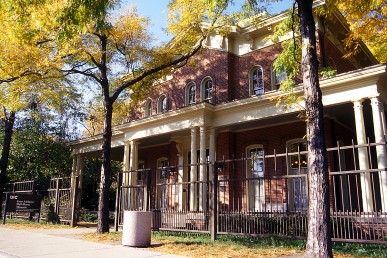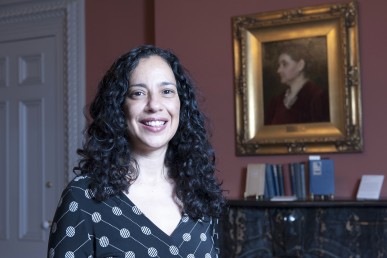Federal grant starts talk about West Side history, gentrification

The Jane Addams Hull-House Museum is housed in the original Hull-House mansion and its rebuilt Residents’ Dining Hall at 800 S. Halsted St. on the UIC campus.
The neighborhoods of Chicago’s Near West Side are gentrifying, but residents and scholars may never have had a forum to talk with each other about the area’s changes now and in the past.
The Jane Addams Hull-House Museum will use a $200,000 grant from the National Endowment for the Humanities to start and advance such conversations. The museum is one of only 20 organizations nationally to receive an NEH Humanities in the Public Square grant, and the only one in Illinois.
“Making the West Side: Community Conversations on Neighborhood Change” will be a year-long study of Hull-House’s historic role in neighborhood change, placing the old and new West Side in a national dialogue about race and gentrification.
The project will juxtapose two historic moments: the 1890s, when Hull-House was established to serve the diverse immigrants settling on the Near West Side, and the 1960s, when urban renewal launched long-range changes. The study and its outcomes will spur needed conversations about unresolved past issues that can inform the present, says Jennifer Scott, Hull-House Museum director.
“Immigration, migration, congestion, industrialization, redlining, massive infrastructure projects, public policy and gentrification have shaped and reshaped the demographics and landscape of this area,” Scott said. “Today, it is largely segregated, with sizable disparities in wealth, housing, employment, and education.
“As a major player throughout the area’s history, the Jane Addams Hull-House Museum is ideally positioned to be an arbiter of conversations that address these issues, along with our partners who are anchors in their communities.”
The museum’s public programs will include:
— a free public forum to be held in the spring, organized with the museum’s local institutional partners, in which local and nationally recognized humanities scholars, activists and artists will talk with local residents and journalists about the history of the West Side.
— subsequent community discussions to be held by four institutional partners: the National Hellenic Museum in Greektown, the National Museum of Mexican Art in Pilsen, the National Public Housing Museum in Little Italy, and the Chicago Public Library’s Douglass Branch in Lawndale.
— public programming, tailored to the needs of each institutional partner, in creative formats like exhibitions, film or oral history.
— a website that relates the area’s history and current changes that may include a curriculum, blog, mapping, video and images, available to teachers and learners everywhere.
The Jane Addams Hull-House Museum serves as a dynamic memorial to social reformer Jane Addams (1860-1935) and her colleagues who were committed to cultivating a human rights agenda that included political, social, economic, and cultural rights for citizens. The museum builds on this tradition through social justice-based education and public programs.
The National Endowment for the Humanities, created in 1965 as an independent federal agency, supports research and learning in history, literature, philosophy, and other areas of the humanities by funding selected, peer-reviewed proposals from around the nation.

